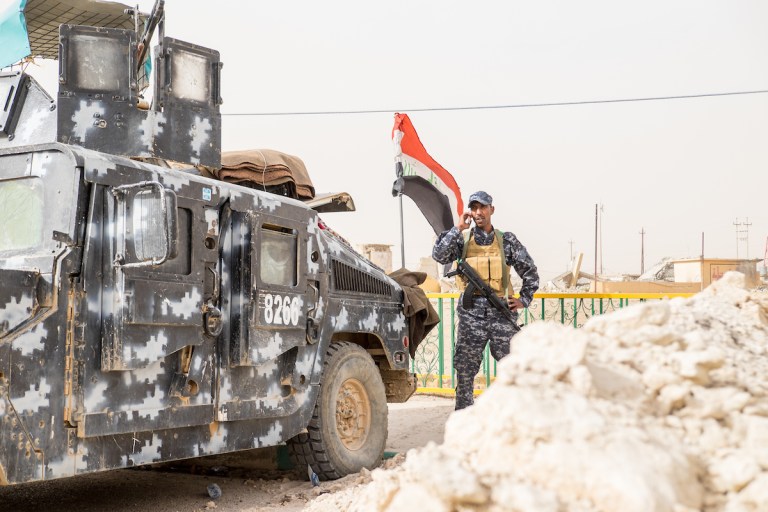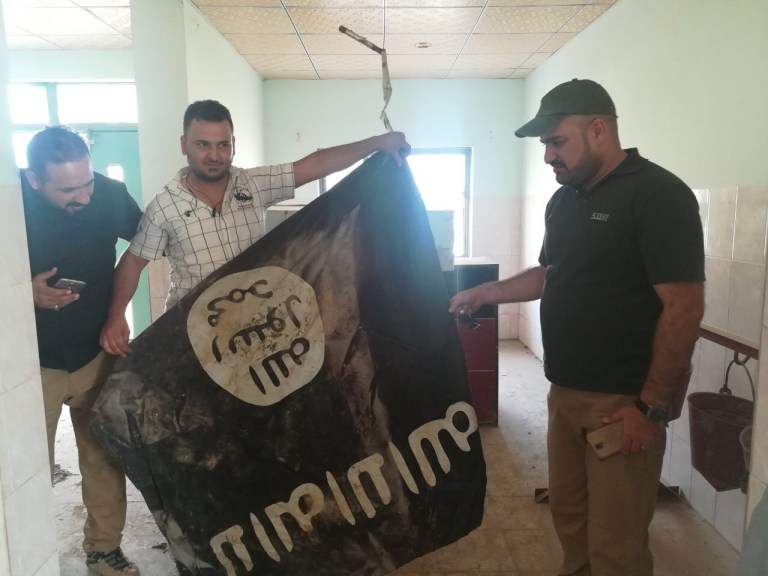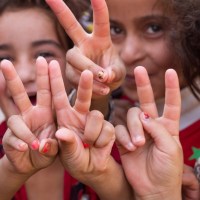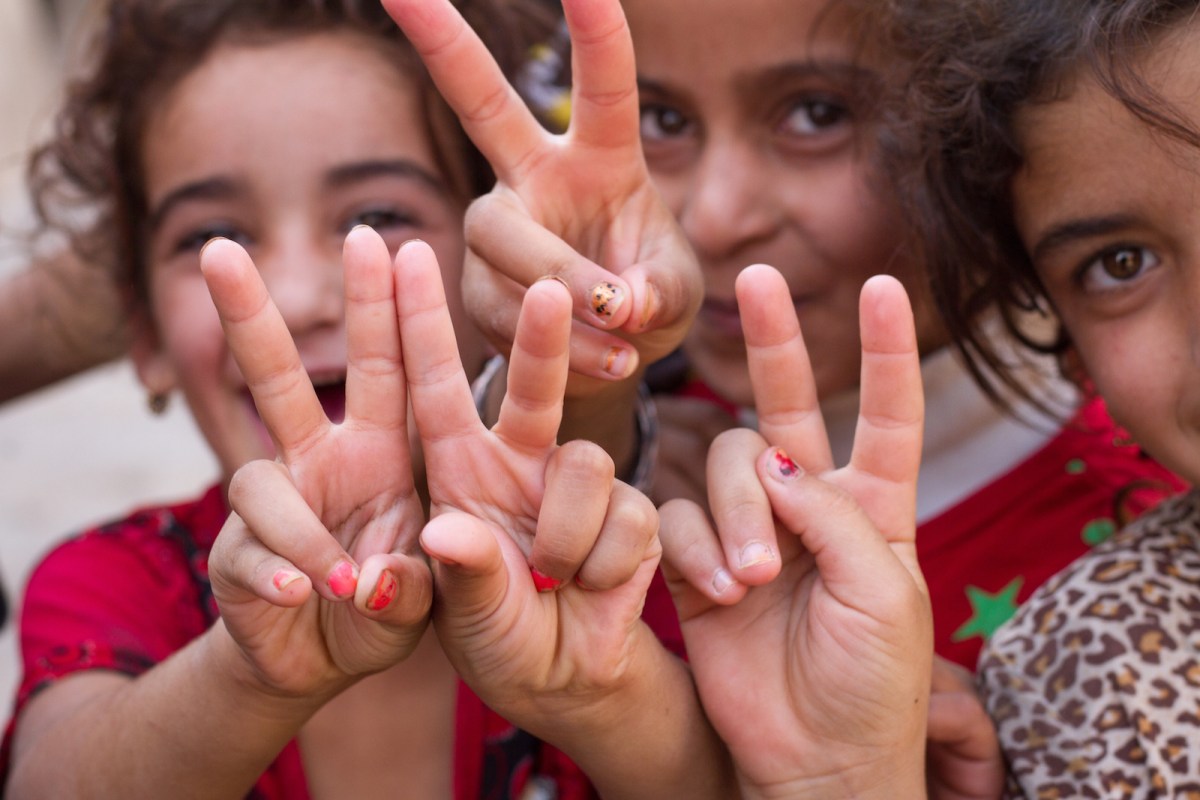On Saturday, the prime minister of Iraq declared the end of ISIS in this country.
The black flag that flew over huge swaths of Iraq for years—bearing witness to all the death, violence, and pain of ISIS rule—every last one of those flags has been ripped down.
“Your lands have been completely liberated, your occupied cities and towns are now safely back to the heart of our nation, and the dream of liberation is now a reality,” Prime Minister Haider Al-Abadi said in a victory speech on Saturday.
“Today, we announce to people of Iraq, and to the world, that our heroes have now cleared the last [ISIS] strongholds, and have raised the Iraqi flag high in the western areas of Al Anbar, which was the last remaining occupied land. Today, our flag flies high over all of Iraq and in most remote border areas.”
ISIS existed for years prior to its 2014 military campaign, when they seized vast territory in Iraq and Syria. But it was their attempt to establish a territorial base—at its height, controlling up to a third of Iraq’s land mass—which triggered a war that claimed thousands of lives, created thousands more orphans and widows, and destroyed whole communities.
Soldiers and civilians alike were out in the streets of Baghdad on Saturday night, celebrating the declaration of victory and the end of war in their country.
“The dream of liberation is now a reality.”
Iraqi Prime Minister Haider Al-Abadi
It’s been a long, hard three years. But before we get too comfortable with thoughts of victory, it’s important to understand what the prime minister’s declaration means practically… and what it does not mean.

What this declaration means is that ISIS no longer controls “significant territory” in Iraq. It no longer functions as a state or governing body in any part of the country.
But are all ISIS fighters in Iraq gone? No.
Pockets of fighters hidden in underground bunkers and the vast western desert continue to be found. ISIS cells remain hidden in cities across the country. While they no longer rule communities, ISIS itself hasn’t disappeared—and neither has their mission.
Is this the end of violence in Iraq? No.
ISIS fighters in Syria still represent a significant threat to Iraq, not to mention fighters in other countries, and those still hidden within Iraq’s borders. Tactics have shifted from governance of land, back to insurgent, guerilla tactics.
Does this military victory mark the death of ISIS ideology? No.
Bullets and bombs don’t kill ideas. ISIS is—and always was—more than an organization or a military force. ISIS is an idea, an ideology. And you can’t bomb ideas out of existence.
RELATED: No Army Can Defeat ISIS, But We Can.
Does this mean that life in Iraq is back to normal? No.
Three million Iraqis are still displaced.
More than 3,000 Yazidi women and girls held as slaves by ISIS are still missing.
Countless Yazidi bodies lie in mass graves, waiting for proper identification and burial so their families can finally have some closure.
Tens of thousands of families are figuring out how to continue without loved ones who were killed during the war.
Whole communities remain piles of rubble, with the estimated costs of rebuilding running as high as $150 billion.

Does this mean Iraqis have finally found unity? No.
“Our victory is made all the more complete with the preservation of Iraq’s unity after coming to… the precipice of the division of our country,” the Iraqi prime minister said on Saturday. “It is the unity of Iraq and its people which constitutes the greatest achievement, praise be to God.”
Prime Minister Abadi spoke several times about unity during his victory speech. In reality, much of the country feels anything but unified. Old sectarian wounds remain unhealed. And the fallout from September’s Kurdish independence referendum continues, threatening to deepen division in Iraq. 
The hardest work begins now. After the guns fall silent. After victory is declared.
The problems in Iraq are the result of years of colonialism, civil wars and Western invasions, mistrust and corruption. They don’t end once ISIS ceases to hold territory. The emergence of ISIS was a symptom of underlying illness, not the cause.
In his speech, Prime Minister Abadi referred to the upcoming fight to build unity, eliminate corruption, and put a stop to every form of terrorism that manifests itself here.
That work requires all of us. Just as we are first in when the bombs start to fall, we have to be last to leave—standing with those who are still displaced after three years of war. We have to stay, not just until cities and streets are repaired—but until hearts are remade and sectarian wounds healed.
We don’t just celebrate the end of violence.
We must work to deny it a new beginning.
We will be there when moms and dads are looking for work, when families are packing to go home, when they need supplies to rebuild their homes, when their kids need help getting back to school.
The dust is clearing in Iraq. This could be a new chapter for millions. Will we be the kind of people who show up for families now, when they need it most?


